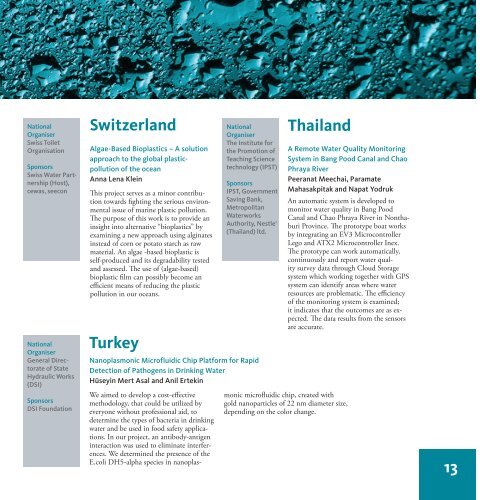2017 Stockholm Junior Water Prize Finalists
Each year, the Stockholm Junior Water Prize congregates young scientists and innovators from around the world who have created new solutions to the planet’s growing water challenges. Each of the finalists represented in Stockholm are the champions of their national competition and have been selected as winners from thousands of entries for their outstanding work.
Each year, the Stockholm Junior Water Prize congregates young scientists and innovators from around the world who have created new
solutions to the planet’s growing water challenges. Each of the finalists represented in Stockholm are the champions of their national
competition and have been selected as winners from thousands of entries for their outstanding work.
You also want an ePaper? Increase the reach of your titles
YUMPU automatically turns print PDFs into web optimized ePapers that Google loves.
National<br />
Organiser<br />
Swiss Toilet<br />
Organisation<br />
Sponsors<br />
Swiss <strong>Water</strong> Partnership<br />
(Host),<br />
cewas, seecon<br />
National<br />
Organiser<br />
General Directorate<br />
of State<br />
Hydraulic Works<br />
(DSI)<br />
Sponsors<br />
DSI Foundation<br />
Switzerland<br />
Algae-Based Bioplastics – A solution<br />
approach to the global plasticpollution<br />
of the ocean<br />
Anna Lena Klein<br />
This project serves as a minor contribution<br />
towards fighting the serious environmental<br />
issue of marine plastic pollution.<br />
The purpose of this work is to provide an<br />
insight into alternative “bioplastics” by<br />
examining a new approach using alginates<br />
instead of corn or potato starch as raw<br />
material. An algae -based bioplastic is<br />
self-produced and its degradability tested<br />
and assessed. The use of (algae-based)<br />
bioplastic film can possibly become an<br />
efficient means of reducing the plastic<br />
pollution in our oceans.<br />
Turkey<br />
National<br />
Organiser<br />
The Institute for<br />
the Promotion of<br />
Teaching Science<br />
technology (IPST)<br />
Sponsors<br />
IPST, Government<br />
Saving Bank,<br />
Metropolitan<br />
<strong>Water</strong>works<br />
Authority, Nestle’<br />
(Thailand) ltd.<br />
Nanoplasmonic Microfluidic Chip Platform for Rapid<br />
Detection of Pathogens in Drinking <strong>Water</strong><br />
Hüseyin Mert Asal and Anil Ertekin<br />
Thailand<br />
A Remote <strong>Water</strong> Quality Monitoring<br />
System in Bang Pood Canal and Chao<br />
Phraya River<br />
Peeranat Meechai, Paramate<br />
Mahasakpitak and Napat Yodruk<br />
An automatic system is developed to<br />
monitor water quality in Bang Pood<br />
Canal and Chao Phraya River in Nonthaburi<br />
Province. The prototype boat works<br />
by integrating an EV3 Microcontroller<br />
Lego and ATX2 Microcontroller Inex.<br />
The prototype can work automatically,<br />
continuously and report water quality<br />
survey data through Cloud Storage<br />
system which working together with GPS<br />
system can identify areas where water<br />
resources are problematic. The efficiency<br />
of the monitoring system is examined;<br />
it indicates that the outcomes are as expected.<br />
The data results from the sensors<br />
are accurate.<br />
We aimed to develop a cost-effective<br />
methodology, that could be utilized by<br />
everyone without professional aid, to<br />
determine the types of bacteria in drinking<br />
water and be used in food safety applications.<br />
In our project, an antibody-antigen<br />
interaction was used to eliminate interferences.<br />
We determined the presence of the<br />
E.coli DH5-alpha species in nanoplasmonic<br />
microfluidic chip, created with<br />
gold nanoparticles of 22 nm diameter size,<br />
depending on the color change.<br />
13


















